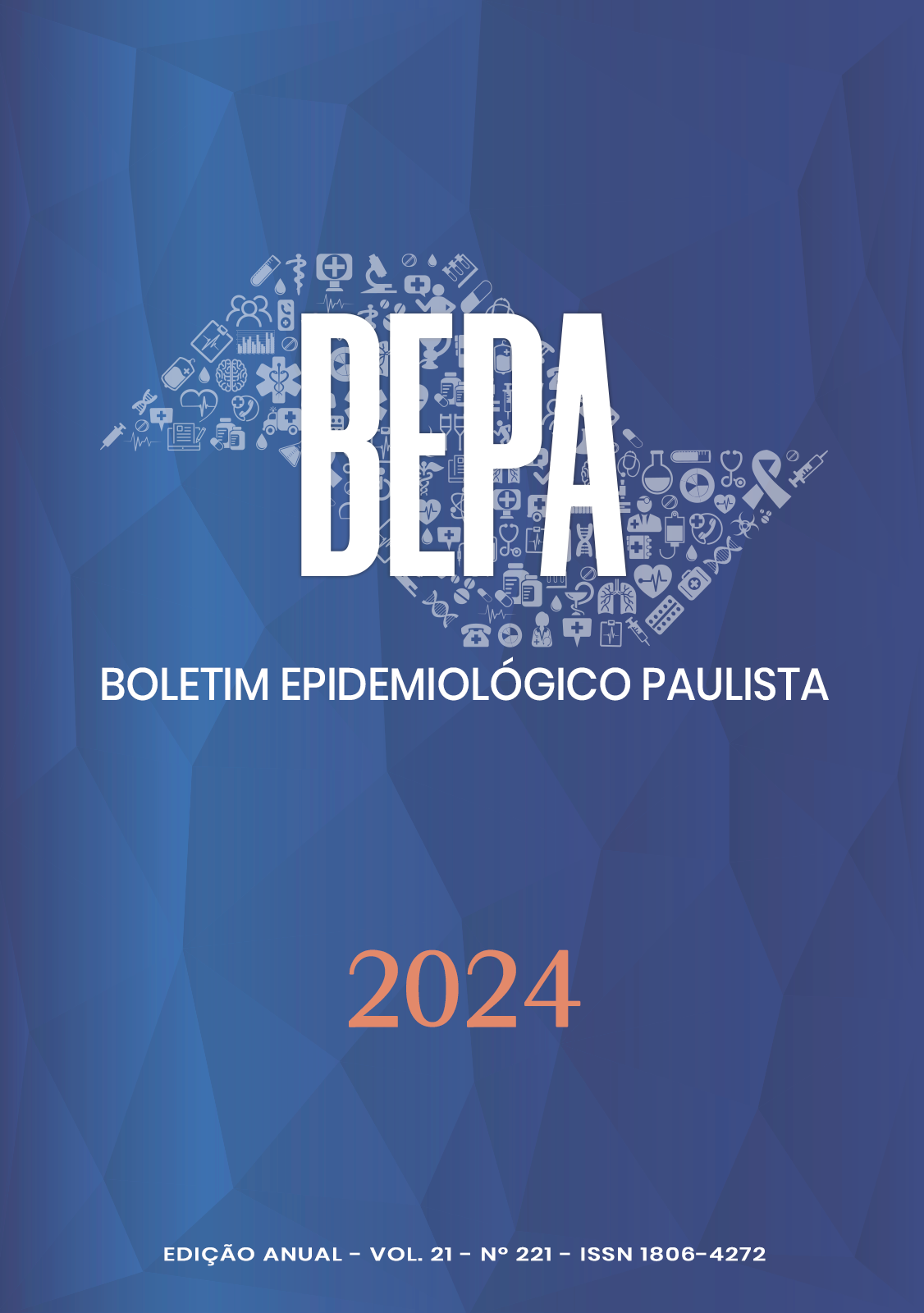Abstract
Objective: To analyze the epidemiological profile and incidence of congenital syphilis in the municipality of Taubaté from 2013 to 2022. Method: A retrospective descriptive study using data from the Department of Informatics of the Unified Health System, Information Systems for Notifiable Diseases and Live Births to analyze confirmed cases of congenital syphilis. Results: In the period studied, there were 444 confirmed cases of congenital syphilis in the municipality, resulting in an incidence rate of 11.54%. 2020 had the highest number of notifications (14.19%) and the highest incidence rate (17.68%). The majority were female (52.25%) and white (86.49%), with diagnosis confirmed within six days of birth (97.97%). In terms of maternal profile, the most frequent age group was 20-24 years (29.50%), with the majority of mothers undergoing prenatal care (88.29%) and diagnosed with syphilis during prenatal care (76.35%). A significant proportion of partners did not receive treatment (54.28%). Conclusion: The high number of cases of the disease in the municipality shows that continued improvement actions and screening and treatment strategies are needed to reduce the incidence of congenital syphilis, as well as the importance of reinforcing the treatment of pregnant women's partners to prevent vertical transmission.
References
1. Ministério da Saúde. Protocolo Clínico e Diretrizes Terapêuticas para Prevenção da Transmissão Vertical do HIV, Sífilis e Hepatites Virais. Brasília (DF); 2022.
2. Ministério da Saúde. Protocolo Clínico e Diretrizes Terapêuticas para Atenção Integral às Pessoas com Infecções Sexualmente Transmissíveis (IST). Brasília: (DF); 2022.
3. Ministério da Saúde. Boletim Epidemiológico da Sífilis. Brasília (DF); 2024.
4. Sonda EC, Richter FF, Boschetti G, Casasola MP, Krumel CF, Machado CPH. Sífilis congênita: uma revisão da literatura. Rev Epidemiol Control Infect [periódico da internet]. 2013 [acesso em out 10 2024]; 3(1):28-30. Disponível em: https://doi.org/10.17058/reci.v3i1.3022
5. Avelleira JCR, Bottino G. Sífilis: Diagnóstico, tratamento e controle. An Bras Dermatol [periódico na internet]. 2006 [acesso em set 29 2024]; 81(2):111-26. Disponível em: https://doi.org/10.1590/S0365-05962006000200002
6. Instituto Brasileiro de Geografia e Estatística – IBGE [boletim na internet]. Cidades: 2022 [acesso em set 24 2023]. Disponível em: https://cidades.ibge.gov.br/brasil/sp/taubate/panorama
7. Gordis L. Epidemiologia. 4. ed. São Paulo: Revinter; 2010.
8. World Health Organization. Global guidence on criteria and processes for validation: elimination of mother-to-child transmission (EMTCT) of HIV and syphilis. Geneva: World Health Organization; 2014.
9. Guidance for the elimination of syphilis and congenital syphilis in the Américas 2024: 11p. Disponível em: https://iris.paho.org/handle/10665.2/61824
10. Gazeta RE, Pereira MDP. Perfil epidemiológico da sífilis congênita e fatores de risco associados na Rede Regional de Atenção à Saúde 3, São Paulo, Brasil. BEPA, Bol.epidemiol. paul. 2023; 20: e39359. doi: https://doi.org/10.57148/bepa.2023.v.20.39359
11. Alves PIC, Scatena LM, Haas VJ, Castro SS, Evolução temporal e caracterização dos casos de sífilis congênita em Minas Gerais, Brasil, 2007-2015. Ciênc saúde coletiva [periódico na internet]. 2020 [acesso em set 20 2024];25(8):2949–60. Disponível em: https://doi.org/10.1590/1413-81232020258.20982018
12. Silva MJN da, Barreto FR, Costa M da CN, Carvalho MSI de, Teixeira M da G. Distribuição da sífilis congênita no estado do Tocantins, 2007-2015. Epidemiol Serv Saúde [periódico nai internet]. 2020 [acesso em set 24 2024]; 29(2):e2018477. Disponível em: https://doi.org/10.5123/S1679-49742020000200017
Í13. Heringer ALS, Kawa H, Fonseca SC, Brignol SMS, Zarpellon LA, Reis AC. Desigualdade na tendência da sífilis congênita no município de Niterói, Brasil 2007 a 2016. Rev Panam Salud Publica [periódico na internet]. 2020 [acesso out 16 2024];44:e8. Disponível em: https://doi.org/10.26633/RPSP.2020.8
M
14. Almeida AS, Andrade J, Fermiano R, Jamas MT, Carvalhaes MABL, Parada CMGL. Sífilis na gestação,fatores associados à sífilis congênita e condições do recém-nascido ao nascer. Texto Contexto Enferm [periódico na internet]. 2021[acesso set 24 2024]; 30:e20200423.. Disponível em: https://doi.org/10.1590/1980-265X-TCE-2020-0423
15. Vilharba E. Perfil Epidemiológico da Sífilis Congênita no estado de São Paulo, The Brazilian Journal of Infectious Diseases [periódico da internet] 2024 [acesso out 16 2024]; 28(2): 104214e. Disponível em: https://doi.org/10.1016/j.bjid.2024.104214
16. Maschio-Lima T, Machado IL de L, Siqueira JPZ, Almeida MTG. Epidemiological profile of patients with congenital and gestational syphilis in a city in the State of São Paulo, Brazil. Rev Bras Saude Mater Infant [periódico da internet]. 2019 [acesso em out 16 2024]; 19(4):865–72. Disponível em: https://doi.org/10.1590/1806-93042019000400007
17. Costa IB, Pimenta IDSF, Aiquoc KM, Oliveira ÂGRC. Congenital syphilis, syphilis in pregnancy and prenatal care in Brazil: An ecological study. PLoS ONE [periódico da internet]. 2024 [acesso em nov 06 2024]; 15(4): e0231029. Disponível em: https://doi.org/10.1371/journal.pone.0231029
18. Santos MM, Lopes AKB, Roncalli AG, Lima KC. Trends of syphilis in Brazil: A growth portrait of the treponemic epidemic. PLoS ONE [periódico da internet] 2020 [acesso em out 18 2024] 15(4): e0231029. Disponivel em: https://doi.org/10.1371/journal.pone.0231029
19. Cunha MR, Leão AB, Santos LJRP, Fachin L P. (2021). Perfil epidemiológico da sífilis gestacional em uma cidade do nordeste brasileiro: clínica e evolução de 2014 a 2019. REAS [periódico da internet] 2021 [acesso em out 16 2024]; 13(3): e6086. Disponível em: https://doi.org/10.25248/reas.e6086.2021
20. Trento NLM, Moreira NM. Perfil epidemiológico, sociodemográfico e clínico da sífilis congênita no Brasil de 2011 a 2020. RSD [periódico da internet]. 2022 [acesso nov 06 2024];11(6):e11211628867. Disponível em: https://rsdjournal.org/index.php/rsd/article/view/28867

This work is licensed under a Creative Commons Attribution 4.0 International License.
Copyright (c) 2024 Lara Rodrigues Maza Alves, Marcella Amorim Franco2, Rafaela Rodrigues Siqueira, Francine da Costa Alves




